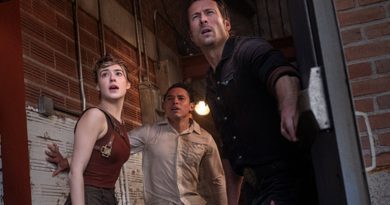Megalopolis (2024) Review: Francis Ford Coppola’s Long-in-the-Making Passion Project Collapsed Under its Own Weight
Francis Ford Coppola’s directing career has been wildly inconsistent post-1970s era but his long-gestating Megalopolis, a passion project that he originally envisioned in the late ’70s before started making notes on everything from 1983 onwards and took him four decades to put everything together, baffles me the most. Amazingly, he risked it all by spending US$120 million of his own money since no studio dared to finance his project.
And after finally watching Megalopolis, it’s perfectly understandable why the studio was hesitant to invest in Coppola’s passion project in the first place. It was a tough sell right from the beginning and despite making a Cannes debut in competition for the Palme d’Or, those who have seen it were largely divided. With Coppola refusing to bow down to a streaming release, he insisted on the traditional cinema-only approach and it was Lionsgate that agreed to distribute his movie. Megalopolis finally made its debut stateside on September 27 to an unsurprisingly muted response, grossing only a paltry US$4 million at No. 6 and the subsequent worldwide total collection generated a lowly US$13.7 million, making it one of the biggest box-office flops in 2024.
So, what went wrong in Megalopolis? The short answer would be nearly everything. The story goes like this: Set in an alternate world of New York called New Rome, Cesar Catilina (Adam Driver) is an ambitious architect who has a grand vision of transforming the decaying city into a new utopia. The utopia in question would be called Megalopolis but to do that, he needs to complete a mass demolition of New Rome to fulfil his dream project. His idea immediately triggers opposition from the mayor of New Rome, Franklyn Cicero (Giancarlo Esposito). Many people strongly support the mayor for retaining the current state of the city as it is.
But that is not all as Cesar somehow possesses the power to stop time and he will also use his state-of-the-art Nobel Prize-winning building material called Megalon for the construction of Megalopolis. The sci-fi elements in the movie are merely an idea that Coppola doesn’t seem to be interested in delving deeper into the subject. It looks as if he wants us to suspend our utmost disbelief and accept it as a concept about the time-stopping power and what Megalon can do. It’s just what it is and that makes the movie even more frustrating.
Coppola’s screenplay also uses the Cesar vs Cicero angle related to the controversial construction of Megalopolis as a metaphor for challenging the norm and embracing something new, no matter how risky it takes. This particular metaphor somehow reflects his own making of Megalopolis, not to mention indirectly criticising the studio system that prefers to play safe with the formula. And yet, the problem here lies in Coppola’s overall execution lacking a much-needed coherent narrative. It’s all about infusing ideas, ideas and ideas to the point of his story simply going through the motions without turning them into something concrete.
Even if Megalopolis is best viewed as an avant-garde experiment, the movie isn’t as conceptually interesting as he thinks. Coppola also attempts to spread his story in multiple directions, one of which includes the introduction of Cicero’s beautiful daughter, Julia (Nathalie Emmanuel) who is attracted to Cesar and the two eventually fall for each other. The forbidden love between Cesar and Julia is more of an afterthought and barely contributes much to give the movie an added emotional weight.
Then, there’s Clodio Pulcher (Shia LaBeouf, hamming it up to the max) who loves to attract attention with his cross-dressing fashion style. He’s Cesar’s cousin who has an ulterior motive later in the movie. His scenery-chewing performance is laughably so bad it’s good as if he’s auditioning for a farce. The same also goes for Aubrey Plaza, whose showy portrayal as Wow Platinum (really, that is the name of her character), a television presenter who doesn’t mind risking it all, even her body to get what she wants. Like LaBeouf, she let it all out with her hammy performance as if she carries the mentality of who gives a f— whether this movie is making sense.
There are more side stories, subplots and whatnot throughout its laborious 138 minutes and they are all as inept as they go. Coppola assembles a few more familiar faces including Jon Voight as Catilina’s uncle and the barely-there Dustin Hoffman, who shows up for a mere paycheck role as Cicero’s fixer, Nush Berman. There’s Laurence Fishburne too, serving as Cesar’s chauffeur and the voiceover narrator as a historian of sorts. Seriously, all the actors here including Adam Driver’s lead role have done better jobs elsewhere.
From the technical point of view, Coppola’s hefty $120 million investment doesn’t seem like it’s worth that much. At least what I saw on the screen is visually inferior with glaringly obvious green screen work while his penchant for the yellow-gold filter that paints his entire movie makes the New Rome look artificial. The thing is, this isn’t the kind of sci-fi movie that incorporates the concept of virtual reality or the dream vs reality angle. That would have been more acceptable but Coppola takes his subject seriously, which in turn, makes the movie unintentionally laughable.
It was sad enough that the once-revered filmmaker has fallen from grace for the longest time, even though he did spring with a few underrated works after his glory days of the ’70s era. Underrated efforts like One from the Heart, Rumble Fish and The Rainmaker proved Coppola’s versatility as a filmmaker exploring different subjects. Will Megalopolis be seen as one of his underrated movies or even a misunderstood masterpiece in years to come? Personally, I don’t think so as Megalopolis is easily the most disappointing work from Coppola.





